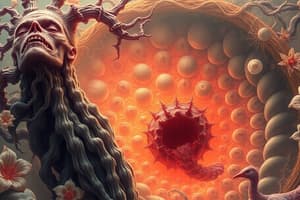Podcast
Questions and Answers
True or false: Theology is only taught in religious institutions such as seminaries?
True or false: Theology is only taught in religious institutions such as seminaries?
False (B)
True or false: The study of theology involves analyzing the supernatural and religious epistemology?
True or false: The study of theology involves analyzing the supernatural and religious epistemology?
True (A)
True or false: Theologians only use philosophical analysis to understand religious topics?
True or false: Theologians only use philosophical analysis to understand religious topics?
False (B)
True or false: Revelation refers to the acceptance of God, gods, or deities as transcendent and above the natural world?
True or false: Revelation refers to the acceptance of God, gods, or deities as transcendent and above the natural world?
True or false: The study of theology is similar to the study of philosophy of ethics and case law in terms of developing arguments?
True or false: The study of theology is similar to the study of philosophy of ethics and case law in terms of developing arguments?
True or false: Brain death is sometimes used as a legal definition of death?
True or false: Brain death is sometimes used as a legal definition of death?
True or false: Turritopsis dohrnii is an example of a biologically immortal organism?
True or false: Turritopsis dohrnii is an example of a biologically immortal organism?
True or false: Death is an avoidable process for all organisms?
True or false: Death is an avoidable process for all organisms?
True or false: Brain death is the next option after clinical death to determine if someone has definitively died?
True or false: Brain death is the next option after clinical death to determine if someone has definitively died?
True or false: Initially, death was defined as occurring when breathing and the heartbeat ceased, a status known as clinical death?
True or false: Initially, death was defined as occurring when breathing and the heartbeat ceased, a status known as clinical death?
Flashcards are hidden until you start studying
Study Notes
Theology
- Theology is the systematic study of the nature of the divine or religious belief, taught as an academic discipline in universities and seminaries.
- It analyzes the supernatural, religious epistemology, and revelation, which pertains to the acceptance of God or gods as transcendent and able to interact with the natural world.
Study of Theology
- Theologians use various forms of analysis and argument (experiential, philosophical, ethnographic, historical, and others) to understand, explain, test, critique, defend, or promote religious topics.
- Arguments often assume the existence of previously resolved questions and develop by making analogies to draw new inferences in new situations.
Death
- Death is the irreversible cessation of all biological functions that sustain an organism.
- For organisms with a brain, death can also be defined as the irreversible cessation of functioning of the whole brain, including the brainstem.
- Brain death is sometimes used as a legal definition of death.
- The remains of a former organism normally begins to decompose shortly after death.
- Death is an inevitable process that eventually occurs in all organisms, except for some biologically immortal organisms like Turritopsis dohrnii, which can still die from means other than aging.
Defining Death
- Initially, death was defined as occurring when breathing and heartbeat ceased (clinical death).
- The development of CPR made this definition no longer strictly irreversible.
- Brain death is the next definition, but multiple definitions exist for this, with some believing all brain functions must cease, while others have different criteria.
Studying That Suits You
Use AI to generate personalized quizzes and flashcards to suit your learning preferences.




